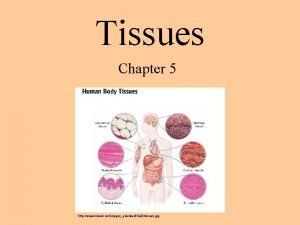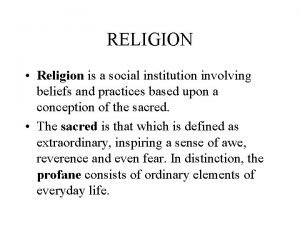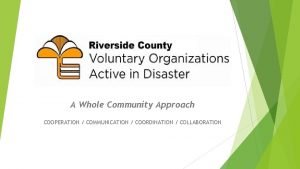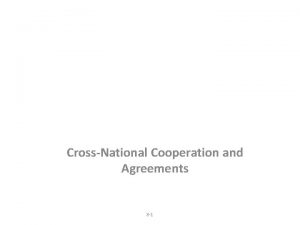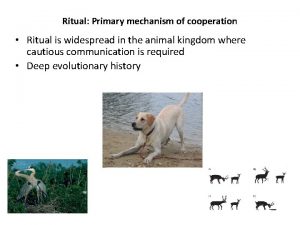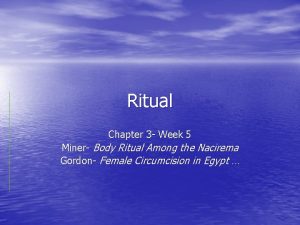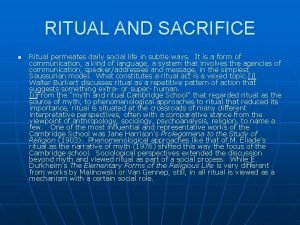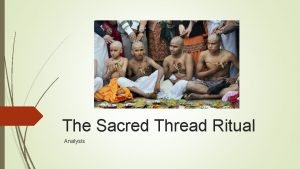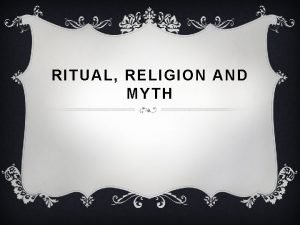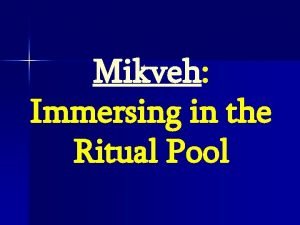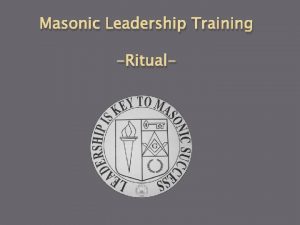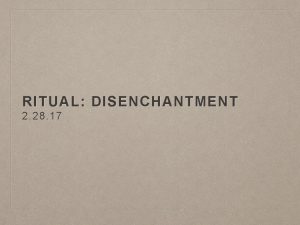Ritual Primary mechanism of cooperation Ritual is widespread












- Slides: 12

Ritual: Primary mechanism of cooperation • Ritual is widespread in the animal kingdom where cautious communication is required • Deep evolutionary history

Primate social rituals • As highly social creatures primates have a wealth of social rituals

Purposes of ritual: • • • social signaling: Stotting among antelope; Thrice daily prayer among Orthodox Jews group cohesion: grooming in primates; initiation rites among traditional societies, modern social groups (fraternities); Coordinated actions produce greater with-in group cooperation. hazard avoidance: ritualized behaviors increase at social “stress” or transition points. Submission, appeasement, tolerance, reconciliation gestures among primates. Bell (1997, p. 160) If ritual had a voice it would say: “This is different, deliberate, and significant—pay attention!” It is the unparallel capacity to send and heed ritual’s message that sets humans apart from other animals Eventually for humans: Ritual imposes meaning on life, supersedes life itself (biology). Ex: Biology controls maturation but ritual defines adulthood. Biology controls birth, death, mating, illness, etc; but rituals imposes structure, meaning, legitimacy, etc. on all. Ritual is larger than life

Social rituals in traditional societies • 3 types – Rituals of trust-building and reconciliation – Rituals of initiation – Shamanistic healing rituals – 3 points: models for the past; cognitively demanding; fitness enhancing – Good analogy: graduation ceremony, ritual demands of larger group vs. kin biased inclinations

Peacemaking and reconciliation • Ammassalik drum match • Yanamamo truce ritual • Those more able to make peace gained a fitness advantage through increased access to resources via reciprocal exchange alliances

Rituals of initiation • • • 70% of traditional societies have adolescent rites of initiation. Severity increases with the harshness of living conditions Those more able to endure demanding rituals gained a fitness advantage through status and prestige Intense, high ordeal rituals lead to stronger emotional attachment to group; greater ingroup generosity

Shamanistic healing rituals • Shamanism is ubiquitous among traditional societies • Ritual healing practices involving ASC are effective for a range of maladies

Evolution of ritual • Milestones: • 3 mybp: birthing big-headed babies (from De. Silva, 2010)

Evolution of ritual • Losing hair: 3 mybp-1. 2 mybp • Host switch of body louse Pthirus from gorilla to human (from Reed et al, 2007) • Mutation in gene melanocortin i receptor (MCi. R) • Making ‘dangerous’ handaxes: . 5 myp • Composite tools: . 3 mybp • Control of fire: 200, 000 • Trade, global migration: 70, 000 ybp • Inter-group marriage • Increasing social differentiation – emerging social norms

Red Ochre Rituals • First appears in archaeological record 400300 ybp • Ubiquitous in female initiation rituals S. African traditional societies • Female Cosmetics Coalition hypo – females bonded together for resourcing of infants, first “true” rituals • Encephalization: two steps, 700, 000 and 200, 000 ybp, Neanderthals later, 70, 000 ybp • Second step critical for pair-bonding

Red ochre in Africa vs. Europe 8000 7500 7000 6500 6000 5500 # of Pieces 5000 4500 Homo sapiens 4000 3500 Neanderthal 3000 2500 2000 1500 1000 500 0 0 50 100 150 200 250 300 Thousand Years Ago 350 400 450

Migrations and Seasonality
 Seedless vascular plants vs bryophytes
Seedless vascular plants vs bryophytes Occurances synonym
Occurances synonym Widespread agreement
Widespread agreement May peace be widespread karakia
May peace be widespread karakia Most widespread tissue in the body
Most widespread tissue in the body Religion is a social institution
Religion is a social institution What decade did radio drama achieve widespread popularity?
What decade did radio drama achieve widespread popularity? Communication cooperation coordination collaboration
Communication cooperation coordination collaboration Inter american accreditation cooperation
Inter american accreditation cooperation International laboratory accreditation cooperation
International laboratory accreditation cooperation Cross national cooperation
Cross national cooperation Archi visio
Archi visio Erasmus mundus external cooperation window
Erasmus mundus external cooperation window




